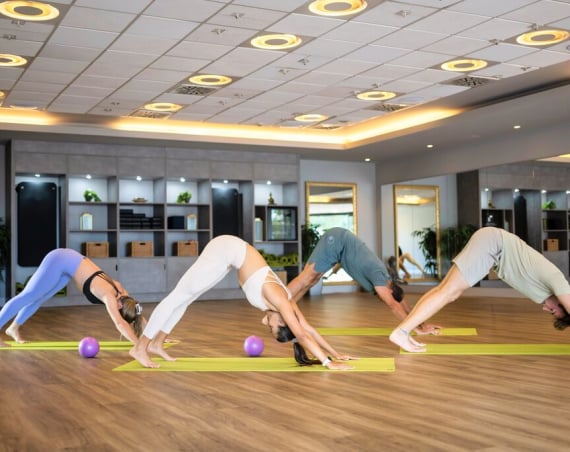It’s not always easy to stick to resolutions and meet your goals. However, there is an alternative that you might find more achievable: setting intentions.
Intentions aren’t resolutions — they are much broader. The idea is to set the intentions and work out how to achieve them in order to improve your well-being.
For example, an intention sounds like, “I intend to prioritise my mental health this year.” Based on this intention, the action point could be, “I will meditate for 5 minutes each day.”
Intentions aren’t as restrictive as resolutions, and they allow more freedom to achieve what you desire. You can always review and create new intentions. They can be set each day, week, month, or even with every new moon!
There are many dimensions to our well-being, and each of these areas requires care and attention. When you’re setting intentions, you’re taking the time to identify the aspects of your well-being that you want to improve, and committing to practices to make these improvements.
We have some suggestions for setting your intentions, but first, think about how each of these areas of well-being currently affects you:
Physical well-being

How we treat and care for our bodies directly correlates to our overall well-being, impacting our ability to cope with the demands and stress of everyday life. Adequate sleep, exercise and proper nutrition should be our priority — they will provide us with a stable base to build on.
Emotional well-being

Emotions guide us, and help us interact and respond to ourselves, others and our environment. How often do you truly take the time to pay attention to your feelings?
We can determine what we need to do to improve or manage our emotional state by connecting to our emotions through practices such as journaling, yoga or meditation. This supports us in managing our feelings, thoughts and behaviours.
Cognitive well-being

Mental or cognitive functioning includes the thoughts we have and the statements we make to ourselves. Our mental health is of the utmost importance and affects every part of our lives. How often do you take the time to rest your mind and to ensure that you are planting positive thoughts, intentions and affirmations?
Social well-being

Social well-being is a term used to describe the people in your life whom you can talk to and count on in times of stress, worry, celebration and day-to-day living. These people should (in general) positively affect your life. Typically, they’re your family, partner, friends, co-workers or members of your social groups.
It’s vital to understand that it’s not so much about the number of people in your social network and more about the quality of your relationships.
Spiritual well-being

Spirituality refers to the non-physical part of our being. Often described as our soul or spirit, it makes us unique. Spirituality is non-religious and can be defined as the connection we feel to other people, nature and all living beings and the world. This connection includes gratitude, compassion, empathy and happiness. Spirituality includes finding meaning in life and having a sense of purpose.
Living well is a journey and is as individual as your fingerprint. Which areas do you want to focus on this year by setting intentions?
How to set intentions
Setting intentions can be a tool for helping us achieve happiness and fulfilment. Intentions allow us to live in the present moment and focus on our goals and visions. It is easy to get lost without an intention, like driving in a car with no end destination.
Our top tips for writing your intentions are:
• Make sure you affirm what you want, rather than what you don’t want
• Write your intentions in the present tense
• Focus on the feeling achieving your intentions would bring
• The best time to plant your intentions is after meditation, as this state encourages a quiet field of possibilities
• Stay centred and let go of trying to work out timings or details
• Practice gratitude in conjunction with your intentions
Examples of intentions
Intention: “I will live my life with purpose.”
It’s easy to go through the motions, but intending to live your life with purpose can be invigorating.
Action: “This year, I will set intentions. I will review these on the last day of each month and set new intentions for the month ahead. At the end of the year, I will review and reflect on how far I have come.”
Intention: “I will prioritise my mental health.”
It’s easy to end up prioritising many things over our mental health.
Action: “This month, I will focus on positive mental health by attending yoga classes, taking a screen-free break at lunchtime and starting a gratitude journal.”
Intention: “I will get enough sleep.”
It’s hard to feel good when we’re exhausted. The National Sleep Foundation states that 7-9 hours of sleep a night is recommended for adults, but this is just a guideline. What’s important is that you wake feeling rested, supercharged and ready for the day ahead.
Action: “I will set my wake and sleep times for the week, not get distracted by my phone or the TV, and prioritise sleep to improve my well-being.”
Intention: “I will move every day.”
You’ll reap mental and physical benefits by setting an intention to move every day, even if that means going for a short walk.
Action: “I am committed to moving daily. I will swim, walk, and lift weights weekly to reach my goals.”
Intention: “I will read more books.”
For some, reading a great book is an act of self-care and a catalyst for personal growth. For others, it’s a better alternative to TV or scrolling on social media. Regardless, we know that reading has the potential to broaden our minds.
Remember, if you’re not keen on the act of reading, there are lots of audiobooks to enjoy!
Action: “I will start this new year by joining a book club. I am committed to meeting and connecting to new people, and excited to get back into reading.”
One final tip
Ever heard of the 80/20 rule?
This involves prioritising your well-being 80% of the time. Then, because you’ve built a strong foundation, for the other 20% you can enjoy cake, have that glass of beer/wine or stay up late – whatever you fancy.
You will be able to enjoy yourself, knowing that the time you have invested will support you in living a happy, fulfilling and healthy life!
Words by Carlie Barlow
Find out more about how you can support your wellness at David Lloyd Clubs.
Find a club



